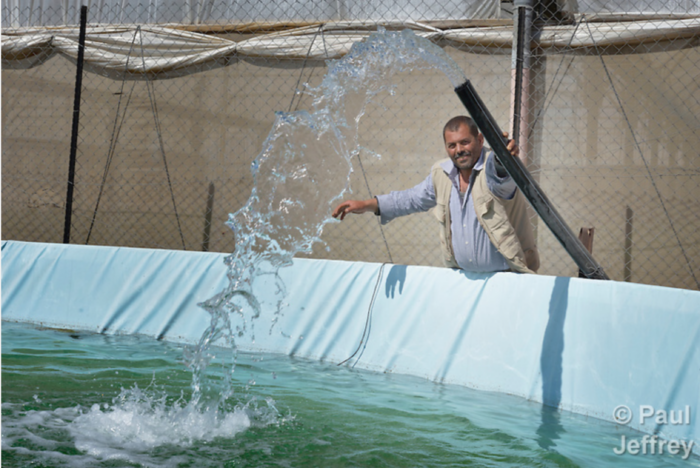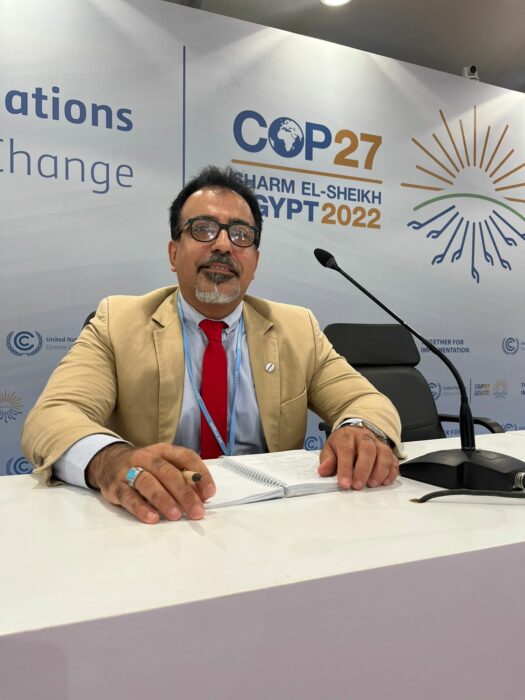
Dr. Ahmad Safi
Climate change is real. As I write this, it is happening at faster than expected rates. The negative impacts of climate change prompts hundreds of governments and heads of state to participate in the annual UNFCCC Conference of Parties; most recently COP27 in Sharm El Sheikh, Egypt.
Palestine has contributed almost nothing to climate change as Palestinians’ greenhouse gas emissions are minimal compared to those of others. Yet Palestine suffers from disproportionate impacts of climate change. According to the Palestinian National Action Plan, Palestinian lands can expect a temperature increase between 3 and 4.5 C° by 2050. Precipitation is also expected to decrease significantly and exacerbate the existing water shortage, especially in the Gaza Strip.
The Gaza Strip has suffered from a severe and worsening water crisis for decades, as the enclave is dependent on a coastal aquifer as its sole source of fresh water. High extraction levels have resulted in major deficits in the groundwater balance, leading to the possible collapse of the aquifer as a water source. The accelerating decrease of the coastal aquifer water level has also resulted in the deterioration of the quality of the groundwater. Seawater now intrudes from the Mediterranean Sea.
Increasing farmers’ resilience and food security
Water shortages and water quality deterioration result in diminished crop production and diversity, which in turn increases farmers’ vulnerability. Weather variability and extreme events damage crops and push farmers into bankruptcy. Combined with unpredictable market conditions, this makes Gaza Strip farming a very risky business. As a result, many farmers are abandoning their livelihoods, increasing food insecurity in the Gaza Strip.
ACT Alliance member Diakonie Katastrophenhilfe has been working to enhance the resilience of the most at-risk communities and farmers in the Gaza Strip for many years. With our local partner organization, the Association for Agricultural Development (PARC), Diakonie Katastrophenhilfe has been working with 17 of the most vulnerable communities using the community-based disaster risk management (CBDRM) approach. Communities establish their own Local Protection Committees that are engaged in the full project management cycle, beginning with risk and needs assessments through to project design, implementation, and monitoring and evaluation.
Rainwater-harvesting ponds and low-cost technology
Building on local knowledge, Diakonie Katastrophenhilfe and PARC have established hundreds of rainwater-harvesting ponds. These range from individual farmer’s ponds and group ponds to communal ponds. They provide farmers with high quality water which meets a significant portion of their irrigation needs and allows them to enhance crop productivity and diversity. In addition, rainwater-harvesting ponds increase farmers’ resilience to frequent power cuts and have decreased flash floods in some of the targeted communities.
Diakonie Katastrophenhilfe and PARC have also provided hundreds of Gaza Strip farmers with low farming tunnels, a low-cost technology that enables them to cultivate more crops. This also allows them more control on cultivation timing and more resilience to weather variability. With low farming tunnels farmers can use mesh or plastic sheeting to protect their crops from the spring heat and the autumn cold. Low farming tunnels increase productivity, crop diversity and give more control to farmers.
Dr. Ahmad Safi, an ACT COP27 Delegate, is the convener of the ACT Palestine Forum and a member of the ACT MENA Climate Justice CoP. He is the Diakonie Katastrophenhilfe Representative for Gaza/Palestine, based in Amman, Jordan. He has a PHD in environmental science and years of experience in disaster risk reduction, environmental action, humanitarian aid, programme management and research and writing. 